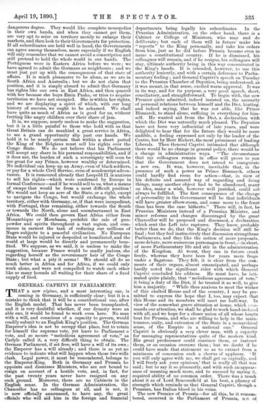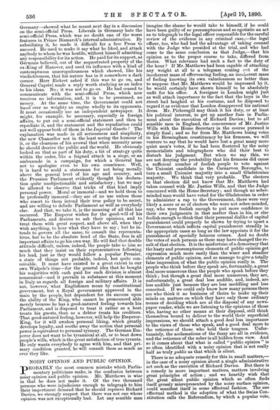GENERAL CAPRrVI IN PARLIAMENT.
PriHAT a new regime, and a most interesting one, is _L coming in Germany, is sufficiently clear; but it is a mistake to think that it will be a constitutional one, after the English model. That has never been transplanted, and it is very doubtful whether, if our dynasty were an able one, it would be found to work even here. No man with a will, and conscious of a capacity to govern, would readily submit to an English King's position. The German Emperor's idea is not to occupy that place, but to retain for himself the supreme vote, yet leave to Parliament a vote, and so secure "melodious agreement of vote," as Carlyle called it, a very difficult thing to obtain. The German Parliament, if set free, will have a will of its own ; the Emperor has a will already; and there is as yet no evidence to indicate what will happen when those two wills clash. Legal power, it must be remembered, belongs to the Emperor-King. Both in Germany and Prussia he appoints and dismisses Ministers, who are not bound to resign on account of a hostile vote, and, in fact, for the past twenty years never have resigned on any such ground. Moreover, there are no Cabinets in the English sense. In the German Administration, the Chancellor has no colleagues at all, and is not, it is now officially announced, to have any, the great officials who will aid him in the foreign and financial departments being legally his subordinates. In the Prussian Administration, on the other hand, there is a Cabinet or College of Ministers, who may and do deliberate ; but each of them will in future make his " reports " to the King personally, and take his orders from him, just as he did before Prussia became even in name a constitutional country. If he is dismissed, his colleagues will remain, and if he resigns, his colleagues will stay, ultimate authority being in this way concentrated in the King's hands. It is intended, however, to use this authority leniently, and with a certain deference to Parlia- mentary feeling ; and General Caprivi's speech on Tuesday to the Prussian Chamber of Deputies, being understood, as it was meant, in that sense, excited warm approval. It was in its way, and for its purpose, a very good speech, short, conciliatory, and straightforward. To begin with, the new Premier quite admitted, indeed insisted on, the necessity of personal relations between himself and the Diet, hinting, and indeed saying, that he was not able, like Prince Bismarck, to stand alone, sufficing in everything for him- self. He wanted aid from the Diet, a declaration with which the Diet was naturally much pleased. The Deputies have not been very influential of late years, and were delighted to hear that for the future they would be more audible, a feeling expressed not only by the leader of the Centre, but by Herr Rickert, the most prominent of leading Liberals. Then General Caprivi intimated that although there would be no change in general policy, there would be a change in administrative ways. "The circumstance that my colleagues remain in office will prove to you that the Government does not intend to inaugurate a new era. It was, however, inevitable that, in the presence of such a power as Prince Bismarck, others could hardly find room for action—that, in view of his definite and assured way of regarding and doing things, many another object had to be abandoned, many an idea, many a wish, however well justified, coUld not - always be fulfilled. The first consequence of the change of personality in the Government will be that individuals will have greater elbow-room, and come more to the front than has been the case hitherto." There will, in fact, be Prussian Ministers instead of a Prussian Minister, and minor reforms and changes discouraged by the great Chancellor will be proposed and discussed, a declaration which sent the Left into raptures. They know, probably better than we do, that the King's decision will still be final ; but they feel instinctively that discussion strengthens Parliaments, and they like the notion of more proposals, more debate, more numerous personages in front,—in short, of more Parliamentary life and stir in the administration of the Kingdom. At worst, they can in future croak freely, whereas they have been for years mere frogs under a flagstone. They felt, it is clear from the com- ments of their organs, almost emancipated, and perhaps hardly noted the significant rider with which General Caprivi concluded his address. He must have, he inti- mated quite plainly, that "melodious agreement of vote," it being a duty of the Diet, if he treated it so well, to give him a majority. "While thus anxious to meet the wishes of this exalted House and of the country, I may be per- mitted to express the hope that I, too, may expect that this House and its members will meet me half-way. In view of the somewhat grave situation at home, which com- mands our attention, we shall be glad to work hand-in-hand with all, and we hope for a closer union of all whose hearts beat for Prussia, and who are willing to help in the main- tenance, unity, and extension of the State in a monarchical sense, of the Empire in a national one." General Caprivi is obviously a very clever man, with a capacity for managing representatives quite of the modern kind. His great predecessor could convince them, or instruct them, or on occasion overawe them ; but we doubt if he could have made that statement so as to extract from a minimum of concession such a chorus of applause. If you will only agree with me, we shall get on capitally, and I will freely ask your opinions,' that is really all that was said ; but to say it so pleasantly, and with such an appear- ance of meaning much more, and to succeed by saying it, required ability of no common order. There was a touch about it as of Lord Beaconsfield at his best, a pliancy of strength which reminds us that General Caprivi, though a Prussian, has Italian blood in his veins.
The new Premier of Prussia—for all this, be it remem- bered, occurred in the Parliament of Prussia, not of Germany—showed what he meant next day in a discussion on the semi-official Press. Liberals in Germany hate the semi-official Press, which was no doubt one of the worst features in Prince Bismarck's internal administration. By subsidising it, he made it difficult for a free Press to succeed. He used to make it say what he liked, and attack anybody to whom he was hostile, without himself admitting any responsibility for its action. He paid for its support, as Germans believed, out of the sequestrated property of the ex-King of Hanover, and used its influence with a kind of contemptuous unscrupulousness which showed, like his vindictiveness, that his nature has in it somewhere a dark corner. Herr Rickert asked if this was to go on, and General Caprivi made a reply worth studying as an index to his ideas. No; it was not to go on. He had ceased to communicate with the semi-official Press, which now receives no information, and, it is to be presumed, no money. At the same time, the Government could not hand over so weighty an engine wholly to its opponents. It must occasionally use an independent newspaper. It might, for example, be necessary, especially in foreign affairs, to put out a semi-official statement and then to repudiate it, and the statement and the repudiation could not well appear both of them in the Imperial Gazette ! The explanation was made in all seriousness and simplicity, the new Chancellor not in the least seeing the humour of it, or the clearness of his avowal that when necessity arose he should deceive the public and the world. He obviously looked on that as part of his duty, a bit of strategy quite within the codes, like a feigned attack in a siege, or an ambuscade in a campaign, for which a General has not to apologise even to his own conscience. Well, it is hard to scold a statesman for not being morally above the general level of his age and country, and the Prussian Parliament evidently thought his declara- tion quite unobjectionable and satisfactory ; but we may be allowed to observe that tricks of that kind imply personal power. Moral or immoral—and we hold them to be profoundly immoral—they are of no use unless those who resort to them intend their true policy to be secret, and are willing to delude Parliament as well as everybody else. And that, we take it, is the meaning of all that has occurred. The Emperor wishes for the good-will of his Parliaments, and desires to ask their opinions, and to treat them with great respect, and above all, when they wish anything, to hear what they have to say ; but he in- tends to govern all the same, to consult the representa- tives, but to be the absolute head of the State, free in all important affairs to go his own way. He will find that double attitude difficult, unless, indeed, the people take to him so much that they insist on their representatives following his lead, just as they would follow a popular Premier, a state of things not probable, indeed, but quite con- ceivable. It must have existed to a great extent in our own Walpole's time—for the general idea that he bought his majorities with cash paid for each division is almost nonsensical—and it prevails in substance at this moment in Italy as regards all foreign and military affairs. It is not, however, what Englishmen mean by constitutional government, but a Royal government approved in the main by the people, but dependent for its success upon the ability of the King, who cannot be pronounced able merely because he has a good-natured feeling towards his Parliament, and is disposed to treat it rather as a host treats his guests, than as a debtor treats his creditors. That good-natured feeling, however, will help the Emperor- King, for it will awaken personal liking, which greatly develops loyalty, and soothe away the notion that personal power is equivalent to personal tyranny. The German Em- peror does not want to be tyrannical at all, or to beat down people's wills, which is the great satisfaction of true tyrants. He only wants everybody to agree with him, and that pri- mary condition granted, he will consult them as much as ever they like.



















































 Previous page
Previous page